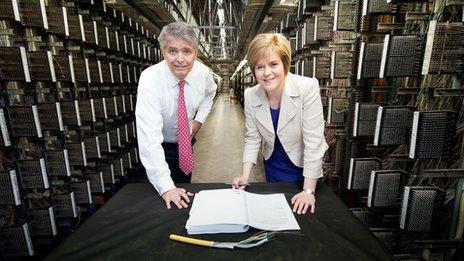Deal to boost high-speed broadband
- Published

Deputy First Minister Nicola Sturgeon signed the deal with BT in Glasgow
A deal has been announced that should bring fibre broadband to 600,000 more Scottish homes and businesses.
It brings together £158m of public funding and £106m from BT.
Following a similar deal announced in March for the Highlands and Islands, this agreement covers the rest of the country, with commitments from 27 of Scotland's 32 local authorities.
It means that 85% should have access to higher-speed fibre broadband by the end of 2015, and 95% two years later.
Early priority will be given to rural small and medium-sized businesses to encourage economic growth in "hard-to-reach" areas.
The investment also includes money through the European Regional Development Fund.
Deputy First Minister Nicola Sturgeon announced the funding during a visit to a BT exchange in Glasgow where the deal was signed.
She said: "Today's announcement signals the start of one of the most ambitious infrastructure projects in the whole of Europe. It will connect communities across rural and urban areas, providing a platform for future economic development and regeneration.
"Next generation broadband enables businesses to compete on the international stage. It has the potential to transform the way in which we educate our children, provide health and social care and deliver our public services.
"It provides Scotland with a platform upon which we can build and sustain a world-class digital country."
Top priority
Bill Murphy, BT managing director of Next Generation Access, said: "Bringing fibre broadband to another 600,000-plus Scottish homes and businesses is a huge civil engineering challenge.
"We're looking forward to rolling up our sleeves and starting work straight away to deliver an outstanding, transformational project."
Councillor David O'Neill, president of local authority umbrella body Cosla, said: "Local communities, especially in rural areas, have been uniformly clear across Scotland that better accessibility to higher speed broadband services was a top priority.
He added: "The contract outcomes will promote local economic development through greater digital access to markets, enable communities to access vital services remotely rather than needing to travel and, as a result, reduce their impact on the environment."
UK government Communications Minister Ed Vaizey said: "The complex and remote landscape of much of Scotland makes this one of the largest and most challenging projects in our nationwide rollout of superfast broadband."
- Published5 July 2013
- Published5 July 2013
- Published26 March 2013